Note: This novel was WINNER of the Campiello Prize for Italy’s Best Book of the Year in 2011 and WINNER also of the Commisso Literary Prize from Treviso, outside of Venice, where the novel takes place.
“I had never seen so many eyes ravaged by terror. The eyes of women with bundles slung round their necks: lifeless bundles and whimpering bundles. I would never have believed that the pain of a whole people in flight, a people to whom until then I had not been aware of belonging, could have affected me so deeply as to become mine, a pain of my own…I was a fly in an upside-down tumbler, twisting and turning against the glass.”—Paolo Spada, age seventeen.
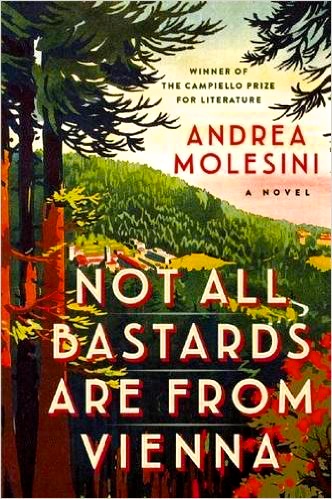 Following the crushing defeat of the Italian army in 1917 by the Germans during World War I, the Villa belonging to the Spada family in Refrontolo, just north of Venice, is requisitioned by the German army and stripped of all its valuables. Crude, victorious soldiers, drunk on their power, delight in tormenting the owners, tearing up cupboards, smashing the contents, and even riding horses inside the Villa until they are stopped by officers in charge. The safety of young females is constantly at risk, and the rules of civilized behavior have been suspended. As one character says, “War and loot are the only faithful married couple.” Living at the Villa which the family has occupied for generations, are the speaker, Paolo, age seventeen, an orphan who has lost his parents and other immediate family in the sinking of the Empress of Ireland in 1914; his grandfather Guglielmo Spada; grandmother Nancy; unmarried aunt, Donna Maria, who acts as the house manager; Teresa, the imaginative cook; and Loretta, her daughter, in her early twenties. Living in a house nearby are the red-haired Giulia Candiani, who has returned to her place of birth because of an indiscretion, a woman who has bewitched Paolo; and her tenant, Grandma Spada’s “Third Paramour,” Pagnini, who occupies a basement room there.
Following the crushing defeat of the Italian army in 1917 by the Germans during World War I, the Villa belonging to the Spada family in Refrontolo, just north of Venice, is requisitioned by the German army and stripped of all its valuables. Crude, victorious soldiers, drunk on their power, delight in tormenting the owners, tearing up cupboards, smashing the contents, and even riding horses inside the Villa until they are stopped by officers in charge. The safety of young females is constantly at risk, and the rules of civilized behavior have been suspended. As one character says, “War and loot are the only faithful married couple.” Living at the Villa which the family has occupied for generations, are the speaker, Paolo, age seventeen, an orphan who has lost his parents and other immediate family in the sinking of the Empress of Ireland in 1914; his grandfather Guglielmo Spada; grandmother Nancy; unmarried aunt, Donna Maria, who acts as the house manager; Teresa, the imaginative cook; and Loretta, her daughter, in her early twenties. Living in a house nearby are the red-haired Giulia Candiani, who has returned to her place of birth because of an indiscretion, a woman who has bewitched Paolo; and her tenant, Grandma Spada’s “Third Paramour,” Pagnini, who occupies a basement room there.

Author Andrea Molesini upon winning the Campiello Prize for Best Novel in Italy in 2011, for this novel.
Author Andrea Molesini, who has lived in this area of northern Italy for much of his life, has absorbed every aspect of its history and is uniquely qualified to describe the effects of the German, and later, the Austro-Hungarian occupation on the lives of the inhabitants, not just of the Villa but of the surrounding area, during the final months of World War I. The few Italians remaining in the area are desperate for a victory over the better-equipped Germans and Austrians who, in turn, are anxious to control the area’s rivers and bridges in their final push to victory. Grandma emphasizes that she wants no rebellion against the overpowering German occupiers of her Villa, however, and she wants as little contact with them as possible. Nodding toward the steward, Renato Manca, an outsider, who is there in the room with the family, she introduces him as someone who “has offered to act as our ears and my voice, talking to the farmhands and referring to me alone, every day, as to what is going on. We have to be careful and circumspect.” In the course of the novel, Renato appears and disappears, sometimes with members of the family and Giulia, and they are often gone all night.
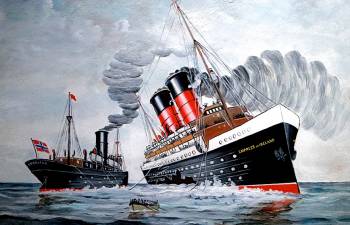
The sinking of the Empress of Ireland, “Canada’s Titanic,” took place in the St. Lawrence River two years after the sinking of the Titanic. Over a thousand people, including Paolo’s parents and other family, died when the ship sank in 14 minutes.
The conduct of the war as seen through the eyes of Paolo offers him many opportunities to “come of age,” and dramatic events occur to keep the reader engaged. Brian Herrick, an Englishman who has an interest in a nearby property, is a pilot who flies over the Villa on many occasions, and Grandma Spada, for all her elegance and spunk, is also a brilliant mathematician, especially creative as a coder. The local parish priest, Don Lorenzo, most famous for his witheringly bad breath, teaches the local children and provides an activity for Paolo who teaches history there. As the Germans get ready to retreat at the end of 1917, the Austrians arrive in force, and the Swedish ambassador and Gen. Von Below, commander of the Austro-German 14th army meet to discuss the exchange of coal, steel, and a large consignment of “machine pistols.” The scene is set for even more violence and a push to conquer the Italians. Major Rudolf Freiherr von Feilitzsch, moves into the Villa, replacing the German, Captain Korpium, as the action moves into 1918 and, ultimately a climactic battle to decide control of the Piave River and its environs.
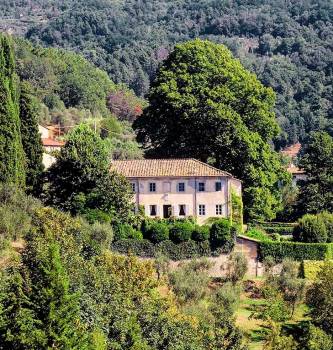
There are several Villa Spadas in Italy. This one in Tuscany resembles the description in the novel.
The novel is cleanly written and uncomplicated in its structure, with appeals not only to a reader’s interest in history but also to his/her emotions, though for the most part it steers clear of easy sentimentality. The reader comes to care about some of the characters and wish for their success in this story. The themes inherent within the action itself need no further elaboration. Because Paolo is young, he often has to have background explained to him, which simplifies the author’s task of developing a big story for the reader within a narrow scope. Some people challenge the occupiers and are summarily executed; other people are not the people they appear to be; some people may be traitors to the family and to Italy; and love stories may real or not. Still, the main action is presented simply – a familiar contest between the “good guys” and the “bad guys” – and when the violence of war results in terrible consequences for some of the characters, the sadness that results is real. Even in war, the reader understands, there can be no exceptions regarding punishments for transgressions – maintaining order takes precedence.
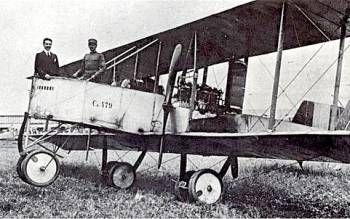
A Caproni bomber from 1914 is featured in this novel. Its simplicity is striking. The man in the nose of the plane is Gianni Caproni, the designer.
As the novel works its way to a dramatic conclusion, all the characters show how the war has changed them, and all have come to important conclusions. Many have possessed their inner strengths all along but have never had any occasion in which to test themselves; others, like Paolo, have become transformed by the events which have so severely tried them. Even the parish priest, Don Lorenzo, emerges from behind his devout Catholicism to reveal a different side in this humorous and ironic scene near the conclusion: “[Don Lorenzo] suddenly swung around towards the door as if he’d sensed a threat. He pulled a foot-long knife out of the drawer. The blade glittered in his hand, then next to his face. He let it fly. A thump. There was a rat twisting and writhing, pinned to the foot of the door. “I got you, you bastard!” The priest cackled and, under his breath, added. “Not all bastards are from Vienna.”
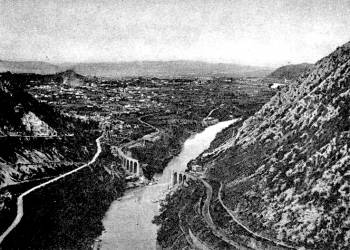
The Battle of the Piave River was one of Italy’s great World War I battles. Note that the bridge has already been destroyed. It is a major part of the conclusion here.
Despite the simplicity of its style and structure, the novel will be a welcome change of pace for many literary readers, at the same time that it offers much for mature young adults interested in a coming-of-age tale of war with its attendant horrors. The surprising conclusion will provide book clubs with much to talk about.
Photos, in order:
The author with his Campiello Prize for Best Novel in Italy in 2011, awarded for this novel. http://photo.infophoto.it/
Paolo’s parents and other family members died in the sinking of the Empress of Ir.eland, Canada’s equivalent of the sinking of the Titanic, which occurred in May, 1914. Over a thousand people died when the ship sank in fourteen minutes after colliding with a coal ship. http://ww1.canada.com/
Several Villa Spadas exist in Italy, including this one in Tuscany, which resembles the description of the Villa in the novel. http://www.worldwarone.it/
Gianni Caproni, the developer of the Caproni bomber (1914), is seen here with his plane, standing in the nose of the fusilage. The plane plays a major part in the novel. https://en.wikipedia.org
The Battle of the Piave River was one of Italy’s great World War I battles. Note that the bridge has already been destroyed. It is a major part of the conclusion here. http://www.worldwarone.it/
